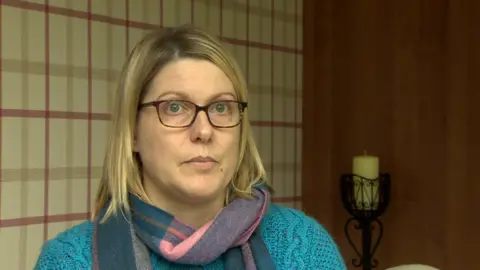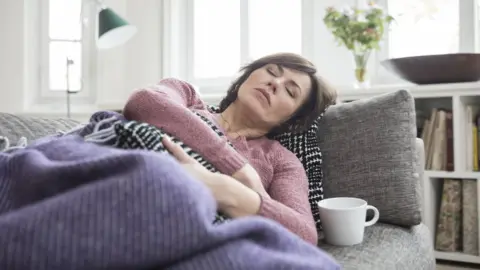Coronavirus: Call to help those suffering from long Covid
 BBC
BBCThere have been calls for a dedicated centre to help those suffering from "long Covid" in Northern Ireland.
It follows an announcement by NHS England last month that £10m will be invested in specialist facilities to deal with those affected by the virus.
"Long Covid" is when people are chronically ill for months with Covid-19 symptoms.
Hurling coach Alex Campbell, 53, from County Antrim, said a clinic would "give reassurance".
"Many people I have talked to suffering similar symptoms for instance gastric problems, terrible ongoing fatigue, uncertainty about how much you can exert yourself," said the Ballycastle man.
"To talk those things through with a professional would be really helpful, really reassuring - take a lot of the uncertainty out of it," he said.
"Lot of people doing their own research and coming to their own conclusions"
 Alex Campbell
Alex Campbell"And I think if nothing else, people getting in to talk about their condition would alleviate a lot of the psychological difficulties with this condition," he added.
The Department of Health (DoH) in Northern Ireland is looking at support for people with long Covid.
It says UK-wide guidance is being developed and should be ready before the end of the year.
It is expected a team will be put together to offer continuing guidance.
The DoH said it would develop its services in light of further findings, as the pandemic was an "emerging and developing situation".
All patients presenting with after-effects of Covid-19, as with any health condition, received the appropriate care from skilled professionals, it said.
"We are also evaluating the impact and value of the impressive local research effort and work, aiming to incorporate evidence based findings into the service work in a timely fashion," said the department.
A clinical advisory cell would brief the chief medical officer and health minister about work carried out in Northern Ireland, and highlight future directions as well as patients' emerging clinical needs.
A regional multidisciplinary working group is expected to be formed to provide continuing guidance, added the department.
 Getty Images
Getty ImagesSaskia Mulder, 40, a psychiatric nurse from Magherafelt, said she had been frightened by the long Covid symptoms she had suffered for the past eight months.
"The scariest symptom has to probably be the inability to breathe - that quite often happens in the dead of night," she told BBC News NI.
"For the past eight months I've had debilitating headaches and I felt like I was taking a stroke.
"Those have been the two scariest times, when I've thought to myself: Is this it?"
'Be listened to, believed and understood'
Saskia has had support from her family and friends.
But it was not until her GP told her about a pilot programme run by NI Chest Heart and Stroke that she felt she was no longer alone.
The people involved, she said, had been "absolute lifesavers - in terms of managing not mine but everybody's mental state - but also helping us manage our symptoms, that fear factor and panicking, keeping that under control.
"To go to somebody through this time and be listened to, and be believed, understood, would have helped my and everybody else's mental health so much, just that reassurance that we weren't alone."

What is long Covid?
There is no medical definition or list of symptoms shared by all patients - two people with long Covid can have very different experiences.
However, the most common feature is crippling fatigue.
Others symptoms include: breathlessness, a cough that won't go away, joint pain, muscle aches, hearing and eyesight problems, headaches, loss of smell and taste as well as damage to the heart, lungs, kidneys and gut.
Mental health problems have been reported including depression, anxiety and struggling to think clearly.

The Covid Recovery Service was established as a pilot by NI Chest Heart and Stroke in July.
Catherine Murnin, director of care services with the charity, said: "People come to us for that support with a range of challenges in terms of living with long Covid."
She said there were "people who are fatigued, they're having problems with breathlessness, maybe problems with sleep, just the whole impact of being isolated and the impact that has on overall health and well-being".
